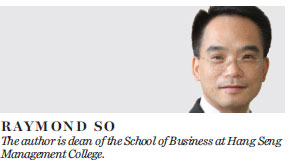Understanding the symbolic meaning behind a name change
Updated: 2015-11-06 08:08
By Raymond so(HK Edition)
|
|||||||
According to some recent reports, the government intends to rename the universal retirement scheme to include such phrases as "economic necessity" or "asset reviews". This has provoked suspicion the government might intend to replace the proposed system of universal retirement protection with a qualified one.
Just like any other policy recommendations put forward by the government, this piece of news has immediately attracted criticism from many parties. Many people are of the view the government is to influence public sentiment by changing the name of the scheme. This notion is particularly popular among those who have long advocated the implementation of a universal retirement scheme.
The idea of a universal retirement scheme has been debated for a long time among Hong Kong people. So it is only natural that any suggestion to change its name now will give rise to suspicion about the real motive behind this. In particular, when mutual trust between the government and some quarters of society is weak, any policy move can provoke a lot of skepticism. This is the pitiful reality of Hong Kong nowadays. The question is how we see the logic behind all of this. We cannot deny the fact that mistrust between various sectors has always triggered conspiracy theories about problems in Hong Kong. The usual way many people think follows this pattern: There must be some hidden agenda behind any policy changes. The change in the phrasing about universal retirement is a case in point.
Those who are against changes in wording are mainly advocates of universal retirement benefits, whose suspicion toward the government is understandable. They have been advocating universal retirement for a long time and would be more than happy to know that the government is now ready to launch a public consultation on this matter. They would definitely want to see a favorable platform in the consultation process. But all of a sudden the idea of changing the wording of the scheme has popped up. Their disappointment can be easily understood.
However, disappointment does not mean that we should shift the focus of the issue. Whether "universal retirement" is an appropriate name for the proposed scheme can be a subject for further discussion. The more important issues, however, are the details of the scheme and its eventual implementation, rather than the name of the scheme. Some critics said that the newly suggested name could be misleading. But the commonly used word - "universal" - can also be misleading. In any policy consultation, the idea is to do a comprehensive study first before all the stakeholders are consulted extensively. Now that the government has done research on this matter it should proceed with a comprehensive consultation. It is not in the best interests of Hong Kong to focus only on the name of the scheme and debate empty ideas. We simply have too much work ahead and have little time for such unnecessary debates.
The issue of whether to change the name of the scheme should not be the focus of the consultation exercise either. In this article I repeatedly use the term "universal retirement" when referring to this policy proposal. This is for the sake of convenience as well as minimizing misunderstanding of various concepts - as the term has been used extensively in previous rounds of discussion. But one may argue that this term can be equally misleading. When one argues over the usage of a term, it clearly indicates that there is a pre-established viewpoint. To me, the quality and success of a policy are always the most important things. We should look at the whole picture, rather than just pursuing self-interest.
Whether or not the name of the proposed scheme is changed is not an issue at all for me. But in the actual consultation documents, it is the government's duty to remain objective by using neutral wordings as much as possible. However, some prejudiced people do not understand this. They tend to suspect that the government is not supporting a policy whenever it uses neutral words to describe it.
From this minor event, it can be seen that it is very difficult to change the name of a policy if it has been used in the discussion. The lesson behind this event is that the government needs to be very careful when dealing with such issues. The best practice is to use neutral terms from the very beginning so that the policy formulation will not be affected by the subjective thinking of certain groups. This minor incident is a good lesson for all of us.

(HK Edition 11/06/2015 page10)